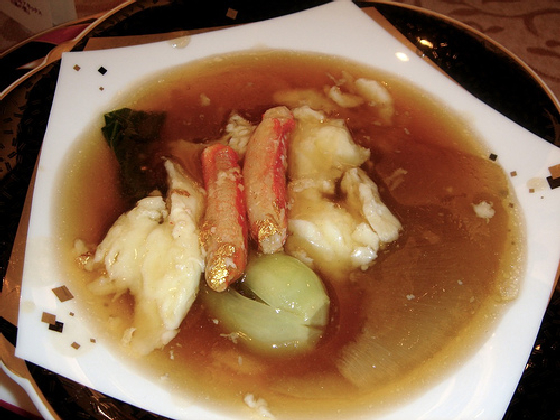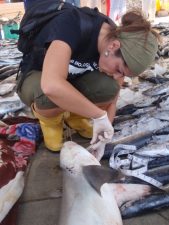 Green Prophet delves into the bloody and murky business of shark fishing and fining in the United Arab Emirates
Green Prophet delves into the bloody and murky business of shark fishing and fining in the United Arab Emirates
Following the recent shocking incident where a pregnant hammerhead female shark and its forty-five pups were found dead at a fish market in Dubai, we decided to delve a little deeper into the murky business of shark fishing (also shark bycatch fishing) and finning in the United Arab Emirates.
Although shark fining was completely unheard of in the region at one point – as it’s not part of Arabian cuisine- the practice is gaining momentum and shark fishing is definitely on the rise.
UAE Is Market Hub for Shark Fins
A week ago, shark fin soup served at a Dubai function did court controversy but the fact remains that shark fin soup is ‘not uncommon in Dubai’. According to a news report on the issue by UAE 7 Days (link not working in 2022), the UAE still plays its part in the controversial trade and is the market hub for what is still seen as a high-status delicacy.
Although shark fining was banned in the United Arab Emirates in 2008, sharks fins are openly sold in the fish markets of Dubai. It is estimated that around 70 million sharks are killed for their fins each year and the UAE provides nearly 10 percent of this world total supply of shark fins.
Shark Dissection Carried Out In Name of Nature
The complete disregard for the shark population was illustrated by another incident around a month ago in Abu Dhabi where a group of teenagers dissected two sharks- all in the name of learning about the environment.
Apparently, the activity was organised by a diving and education charity Tawasul which aims to teach children about marine biodiversity. Even more shocking is the fact that the dissection was supervised by Rima Jabado who, according to the UAE National, “has been working for more than a year to determine how much local fishing is contributing to the rapid decline of sharks, which are also disappearing globally.”
Fining and Death of Pups Major Threat
The biggest threat to the shark population comes from hunting shark pups, catching pregnant females and fining. Ibrahim Al Zu’bi from the Emirate Diving Association told UAE 7 Days that continued shark fining and indiscriminate fishing could spell disaster for the ecosystem.
“If you over-fish anything, you will eventually see a negative impact on the marine system,” Al Zu’bi explained.
Image via Julia Spaet- KAUST PhD student researching shark populations in the Red Sea.
For more on sharks in the MidEast see:
Dubai Marine Life At Risk After Devastating Shark Catch
Kuwaiti Sharks, Ecosystems and Exxon
25 Shark Species In Persian Gulf Need Urgent Protection
Dolphins and sharks are unsustainable bycatch in fishing industry




I am just watching a report on the spanish channel RTVE International about Spanish people living in Dubai, and while interviewing a spanish guy who has a spanish restaurant they were filming in a food market and showed a pile of dead sharks for sale in DUBAI!!!
It is grotesque…
@ Arwa – I read your article and was extremely disapointed in the misleading facts you wrote.
To start with, the dissections took place in Dubai and not Abu Dhabi.
I have been to a couple of Rima’s educational talks on various marine conservation issues including threat to sharks in the region. Inspired by her work and the her level of scientific knowledge, I have since volunteered with her on several of her field trips.
Therefore I believe I can allow myself, after gaining an insight on her way of working to comment on your article.
I am very pleased that you are taking the initiative to contact her (albight a bit too late)and I look forward to reading a factual account of what’s going on in the region with regards to shark conservation – as far as I know Rima is the only scientist investigating the trade in sharks in the region.
Poor shark, we will vigorously advocated not eating shark fin soup!
Thanks David, I have actually got in touch with Jonathan Ali Khan about doing a piece with various shark experts and also offered to speak to Rima about her work etc- so keep an eye out for it!
@Arwa I think you should contact Rima Jabado, find out about her project and actually visit the fish markets with her to see the good work she is doing and explain why the dissections are beneficial; you will then be able to write an objective and researched article. As you admit this is a misunderstanding but such a misunderstanding, especially one by a journalist, can reflect badly upon an individual, in this case Rima. You have an opportunity here to get the full story and make things right, I hope you act upon that.
About dissection… I believe that in the majority of cases animal bodies used for dissections are gathered in unethical ways, and so I am in general against most dissections. I’m not sure, though, that dissection is an *a priori* vice. Furthermore, I don’t see how humans could come to fully understand biology and animal anatomy if nobody ever dissected any animals. So I think that at least occasional dissections are essential to the full appreciation of biology and ecology. Dissections seem, however, to be contrary to the spirit of environmental awareness and conservation. But are they really? I’m still developing my opinion on this, and I think it’d be great if Green Prophet gave Rima Jabado an opportunity to express her thoughts on the role of and appropriateness or inappropriateness of dissections in fostering environmental and conservation awareness.
Hey Jonathon,
Thanks for your comment.
I just want to say that I was accurate- Rima did supervise the dissection and I only expressed my personal shock at that. Yes, I did not have the entire picture and my shock was due to my assumption (not repeated in the article I might add) that the sharks had been caught solely for dissection. They weren’t and and admitted as much in my above comment.
I still don’t understand why you’re being so defensive- it was a genuine misunderstanding not some attempt to smear Rima. I would really like to make that clear. I am sure Rima is doing great work to protect sharks.
Finally, I still don’t see how dissecting sharks can inspire recruits to marine biology but hey, that’s just my opinion.
I got the stats from this Al Jazeera article: http://blogs.aljazeera.net/africa/2010/03/16/once-feared-predator-now-endangered
Arwa
@Arwa, I think the main point here is that accuracy needs to be upheld as part of any form of written expression when dealing with something as critical as shark conservation. Of course, this is your blog and how you present your views is entirely up to you. Unfortunately the comments about Rima lacked information to convey the full picture and ended up casting very misleading dispersions about her work. I was shocked to see what appeared to be a dig. Rima is doing really important work at a scientific level and we have to accept that at times science is not always following a methodology that appeases the conservationists. Dissection has it’s uses and should not be confused with vivisection! I am not saying that the ends justify the means, but I am saying that research is obviously crucial to resolving the issues facing us. Conservation without the science becomes an exercise in futility as we are still learning about sharks and their natural life cycles. It is fundamental that in order to uphold a position on shark and other conservation issues, facts and figures need to be as scientifically sound as current data allows. Rima is a shark conservationist and a scientist in equal measure and is involved in research designed to help sharks survive the pressures facing them. Her work will be extremely useful at a practical level for the sustainable management of shark fisheries in the UAE. As for dissection of sharks, understanding stomach contents alone leads to many insights into the life of sharks. As for inspiration, introducing a group of youngsters to the scientific methodology of her work is a great way to inspire a few new recruits to marine biology. I for one, would rather work with one well intentioned good shark scientist than a room-full of well intentioned but misinformed conservationists in the struggle to defend sharks from the systematic annihilation they are facing. In these times of growing awareness, we can’t afford to make too many mistakes or present inaccurate stats. It is essential that arguments are credible and convincing. Having said that, I would like to ask how you reached the estimate that the UAE supplies 10% of the world’s shark fins from the 70 million sharks killed annually?
@David- thanks for the clarification and I appreciate that as the sharks were not caught to be dissected that it changes things somewhat. I am however, still very much against dissection as it’s been widely shown that its uses are over-estimated. I also struggle to see how cutting up a shark inspires people to save them…but that’s just me.
@Aimee- I think you make a very good point, without a ban on eating shark fins, the ban on shark fining feels a little empty.
@Shelley- thanks for your sensible comment and your call for moderation and real action to protect sharks.
It makes me feel sick that we as human beings can be so ignorant and so selfish. Its like we are in a race to see just how quickly we can wipe out all of the other species on the planet (and inevitably ourselves). I am not a huge fan of dissection but I don’t think that its a good enough reason to get in a fight about who is wrong and who is right (@ David and author). I wish there was more good news than bad news these days but it seems that the more we become aware about whats going on out there, the worse it gets. Come on UAE, do something about this already.
They sell shark fin soup in restaurants here. If we’re going to be serious about the ban on fishing sharks, makes sense that there should be a ban on eating them too.
As far as I know Rima Jabado is dissecting sharks as part of her PhD project and combining education and research is the only way to protect sharks in the region.
The sharks were already caught for sale as meat and not fished specifically for Rima’s project. I know that she is organising many volunteers to raise awareness in the region and doing an amazing job to help educate about sharks.
Your uneducated comments about Rima’s project should show people not to read and give any weight to your articles as they are obviously poorly researched and you are attacking the wrong people.
Why?????